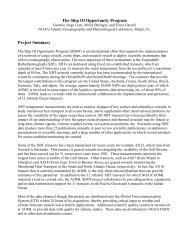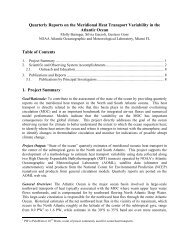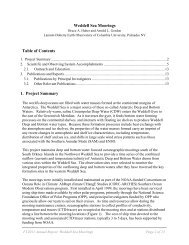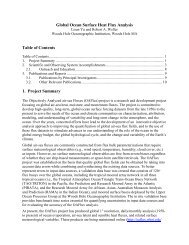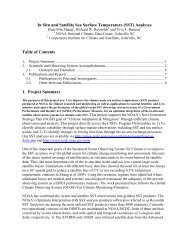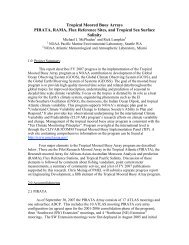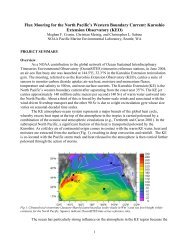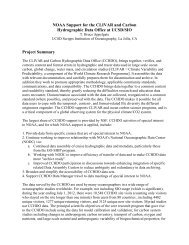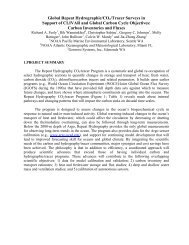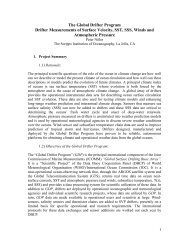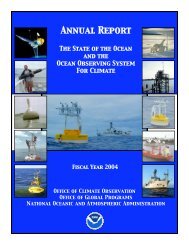GCOS Implementation Plan - WMO
GCOS Implementation Plan - WMO
GCOS Implementation Plan - WMO
Create successful ePaper yourself
Turn your PDF publications into a flip-book with our unique Google optimized e-Paper software.
FOREWORD<br />
This 2010 Update of the <strong>Implementation</strong> <strong>Plan</strong> for the Global Observing System for Climate in Support<br />
of the UNFCCC 1 was prepared in response to a request by Parties to the United Nations Framework<br />
Convention on Climate Change (UNFCCC) expressed at the 30 th session of the UNFCCC Subsidiary<br />
Body for Scientific and Technological Advice (SBSTA) in June 2009 and confirmed in UNFCCC<br />
Decision 9/CP.15 (December 2009). It was prepared under the overall guidance of the Global Climate<br />
Observing System (<strong>GCOS</strong>) Steering Committee and its Chairs (initially John Zillman, followed in<br />
January 2010 by Adrian Simmons), supported by a task team led by Paul Mason (the former Chair of<br />
the <strong>GCOS</strong> Steering Committee) and including the <strong>GCOS</strong> Panel Chairs and staff of the <strong>GCOS</strong>, Global<br />
Ocean Observing System (GOOS) and Global Terrestrial Observing System (GTOS) Secretariats.<br />
Full implementation of the 138 Actions recommended in this <strong>Plan</strong> over the coming five years will<br />
ensure that countries have the observational information needed to understand, predict, and manage<br />
their response to climate and climate change over the 21 st century and beyond. It will address the<br />
commitments of the Parties under Articles 4 and 5 of the UNFCCC and support their needs for climate<br />
observations in fulfilment of the objectives of the Convention. The Actions in this <strong>Plan</strong>, if fully<br />
implemented by the Parties, will provide a major contribution to the <strong>WMO</strong>/IOC-UNESCO/UNEP/ICSUsponsored<br />
<strong>GCOS</strong> and the evolving climate information services it supports.<br />
The <strong>Plan</strong> calls for sustained observations of the Essential Climate Variables (ECVs) that are needed<br />
to make significant progress in the generation of global climate products and derived information; the<br />
document also recommends enhanced support to the research, modelling, analysis, and capacitybuilding<br />
activities required by all Parties to the UNFCCC. Furthermore, the need for observational<br />
records to improve seasonal-to-interannual climate predictions is also addressed.<br />
This <strong>Plan</strong> updates an original version published in 2004. It takes account of the latest status of<br />
observing systems, recent progress in science and technology, the increased focus on adaptation,<br />
enhanced efforts to optimize mitigation measures, and the need for improved predictions of climate<br />
change.<br />
A draft version of this document was subject to a two-month web-based open review by the<br />
community from November 2009 until January 2010. The <strong>GCOS</strong> Steering Committee expresses its<br />
thanks to all institutions and individuals who provided around 450 individual comments which helped<br />
improve the content considerably.<br />
The <strong>GCOS</strong> Steering Committee approved the release of this <strong>Plan</strong> for general publication, and for<br />
submission to the UNFCCC and general publication in August 2010. It has been submitted to the<br />
UNFCCC Secretariat as a final document for consideration by Parties at SBSTA 33, to be held in<br />
conjunction with the UNFCCC Conference of the Parties (COP) 16 in Cancún, Mexico.<br />
Adrian Simmons, Chair of the <strong>GCOS</strong> Steering Committee (August 2010)<br />
1 The 2004 version of this <strong>Plan</strong> is available at http://www.wmo.int/pages/prog/gcos/Publications/gcos-92_GIP.pdf



